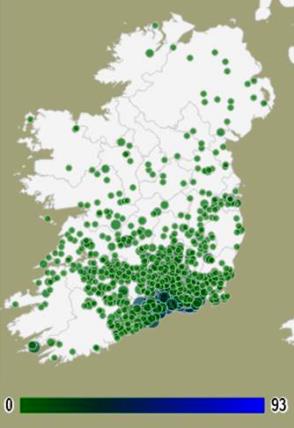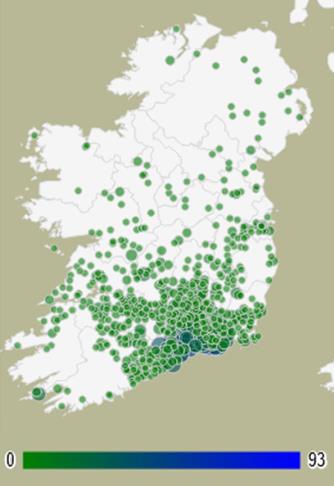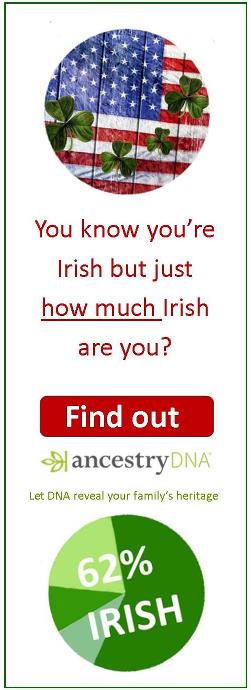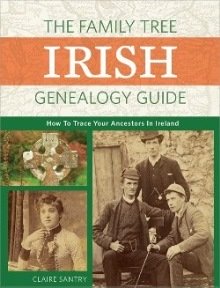- Home ›
- Irish names ›
- The Power Surname
The Power of a surname
The Irish surname Power is of Norman (French) origin, and was brought to Ireland with the Anglo-Norman invasion of the late 12th century, an event that led to 800 years of rule of the island by its bigger neighbour.
Its origins are not certain. It may come from the Old French povre, meaning poor, but possibly with connotations of the virtue of giving up worldly wealth . An alternative origin is from pohier meaning a native of Pois, in Picardy, France. French-speakers should not be confused... the pois in this story is not of the green petit pois variety.
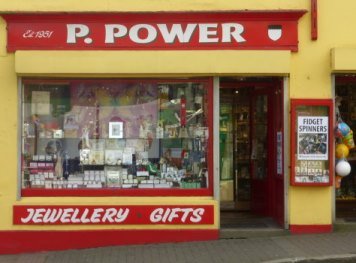 Looking for gifts, souvenirs, jewellery and holiday paraphernalia? Get to the Power shop in Arklow, Co Wicklow.
Looking for gifts, souvenirs, jewellery and holiday paraphernalia? Get to the Power shop in Arklow, Co Wicklow.It is the Old French word for fish (modern French poisson)
and refers to the river that flows through, and mostly under in modern
times, the centre of the market town, more recently known as
Poix-de-Picardie.
The surname can also be found in 'Le Poer', and in an exclusively Irish version: 'De Paor'.
In 1177, the Anglo-Norman King Henry II of England granted Robert Le Poer the City of Waterford and most of what is now County Waterford, on the south coast.
Remarkably, County Waterford remains the county most strongly associated with the surname Power. You can hardly walk down a street without encountering someone, a shop, or a business with the name.
Although it has since spread into neighbouring counties of Cork, Kilkenny, Tipperary and Wexford, Power remains the most common surname in County Waterford. Such are the numbers, it is difficult to imagine this will change any time soon.
In the map above you can see the level of concentration of Powers on the county of Waterford in the mid-19th century. Some 50 years later, this pattern still held true (see 1901 Census map below).
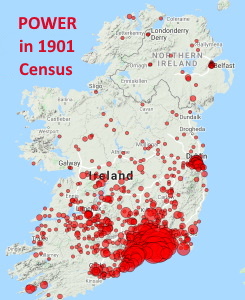 More than 11,100 individuals with the last name Power were recorded in the 1901 Census of Ireland. More than 4,800 resided in Co. Waterford and another c4,000 in its four bordering counties.
More than 11,100 individuals with the last name Power were recorded in the 1901 Census of Ireland. More than 4,800 resided in Co. Waterford and another c4,000 in its four bordering counties.Power's Whiskey
Power's is a brand of Irish whiskey.
It dates to 1791 when a Dublin innkeeper, James Power, set up a small distillery at 109 Thomas St, Dublin 2. As sales grew, the distillery, now called John Power & Son, relocated to nearby premises in John's Lane and continued production there until 1976.
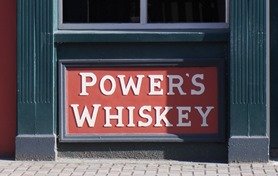 Enamel advertising sign for Power's Whiskey on wall of pub in Bandon, Co Cork.
Enamel advertising sign for Power's Whiskey on wall of pub in Bandon, Co Cork.Production continues in Midleton, Co Cork as part of the Irish Distillers group.
The Irish surname Power goes plural after crossing the Atlantic
The Irish surname Power is of Norman (French) origin, and was brought to Ireland with the Anglo-Norman invasion of the late 12th century, an event that led to 800 years of rule of the island by its bigger neighbour.
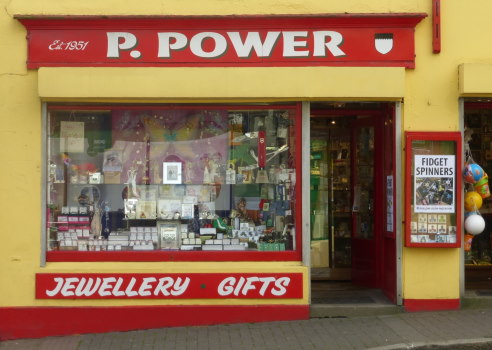 Jewellery, gifts and souvenirs are on sale at the Power shop in Arklow, Co Wicklow.
Jewellery, gifts and souvenirs are on sale at the Power shop in Arklow, Co Wicklow.Its origins are not certain. It may come from the Old French 'povre', meaning poor, but possibly with connotations of the virtue of giving up worldly wealth .
An alternative origin is from 'pohier' meaning a native of Pois, in Picardy, France. French-speakers should not be confused... the pois in this story is not of the green petit pois variety.
It is the Old French word for fish (modern French poisson)
and refers to the river that flows through the centre of the market town, more recently known as
Poix-de-Picardie.
The surname can also be found in 'Le Poer', and in an exclusively Irish version: 'De Paor'
In 1177, the Anglo-Norman King Henry II of England granted Robert Le Poer the City of Waterford and its hinterland on the south coast.
Remarkably, County Waterford remains the county most strongly associated with the surname Power. You can hardly walk down a street without encountering someone, a shop, or a business with the name.
Although it has since spread into neighbouring counties of Cork, Kilkenny, Tipperary and Wexford, Power remains the most common surname in County Waterford. Such are the numbers, it is difficult to imagine this will change any time soon.
Power's Whiskey
Power's is a brand of Irish whiskey.
It dates to 1791 when a Dublin innkeeper, James Power, set up a small distillery at 109 Thomas St, Dublin 2. As sales grew, the distillery, now called John Power & Son, relocated to nearby premises in John's Lane and continued production there until 1976.
 Enamel advertising sign for Power's Whiskey on wall of pub in Bandon, Co Cork.
Enamel advertising sign for Power's Whiskey on wall of pub in Bandon, Co Cork.Production continues in Midleton, Co Cork as part of the Irish Distillers group.
In the map above you can see the level of concentration of Powers on the county of Waterford in the mid-19th century. Some 50 years later, this pattern still held true (see 1901 Census map below).
 More than 11,100 individuals with the last name Power were recorded in the 1901 Census of Ireland. More than 4,800 resided in Co. Waterford and another c4,000 in its four bordering counties.
More than 11,100 individuals with the last name Power were recorded in the 1901 Census of Ireland. More than 4,800 resided in Co. Waterford and another c4,000 in its four bordering counties.The Irish surname Power goes plural across the Atlantic
Somewhere during the crossing from Ireland to the USA, the great historical Irish surname Power went plural. The 2010 USA Federal Census recorded 91,970 individuals with the surname Powers, making it the 336th most common surname in the States, but only 14,890 people with the family name of Power. The latter was noted as the 2,435th most common surname, so not really very common at all.
How had this happened? I have no idea! In Ireland and Britain, where many Irish Power families migrated after the Famine of the 1840s, the name is almost always known in the singular.
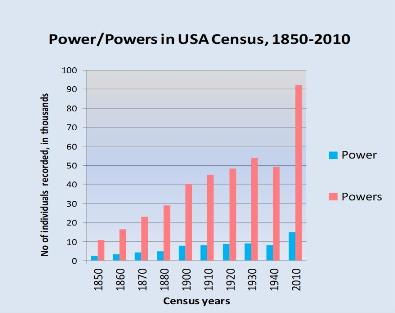
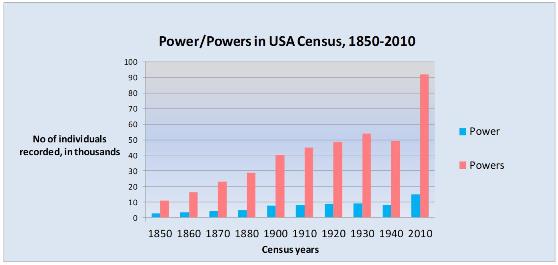
But as you can see from the graph above, even as far back in the 1850 census, the 'preferred' family name in the USA, judging by the number of occurrences, is Powers. This 'preference' has even extended in the last 60 years.
It could be that there is something else at play to explain this significant divergence from the Irish surname Power, singular. Perhaps there is another group of immigrants in the US whose name Powers originates from a difference source. If you've any insight into this, please drop me a line via the Contact page.
Paddy Power
Paddy Power is an Irish bookmaker established in Dublin in 1988. It has a chain of licensed betting shops across the island and in Britain, as well as a large telephone/online betting service offering sports betting, bingo and casino. Now merged with Betfair, the company promotes its strong Paddy Power brand with risqué advertisements.
Paddy Power
Paddy Power is an Irish bookmaker established in Dublin in 1988. It has a chain of licensed betting shops across the island and in Britain, as well as a large telephone/online betting service offering sports betting, bingo and casino. Now merged with Betfair, the company promotes its strong Paddy Power brand with risqué advertisements.
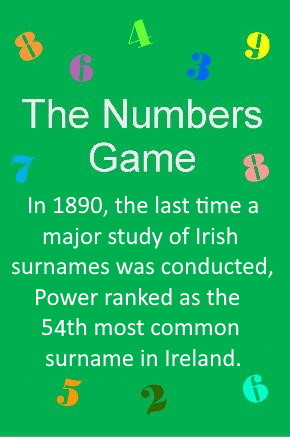
Varients of Power
In
genealogy research, you always have to be alert to the possibility of
varient spellings of surnames. When the majority of people were
illiterate, surnames could have been recorded by a clerk or a priest in
any form, and the surname holder wouldn't know one way or another!
With Power, while there are a small handful of genuine varients - Le Poer (a French version), De Paor (the Irish version), and Powers - most alternative spellings are simply errors. Powr and Powre are examples.
In Griffith's Valuation (1847-1864), the number of households recorded with the surname Power was 3,327, with all but 12 spelled as Power.
Of that dozen, 8 chose Poer while 4 preferred the plural form of Powers.
Find out more at JohnGrenham.com.
